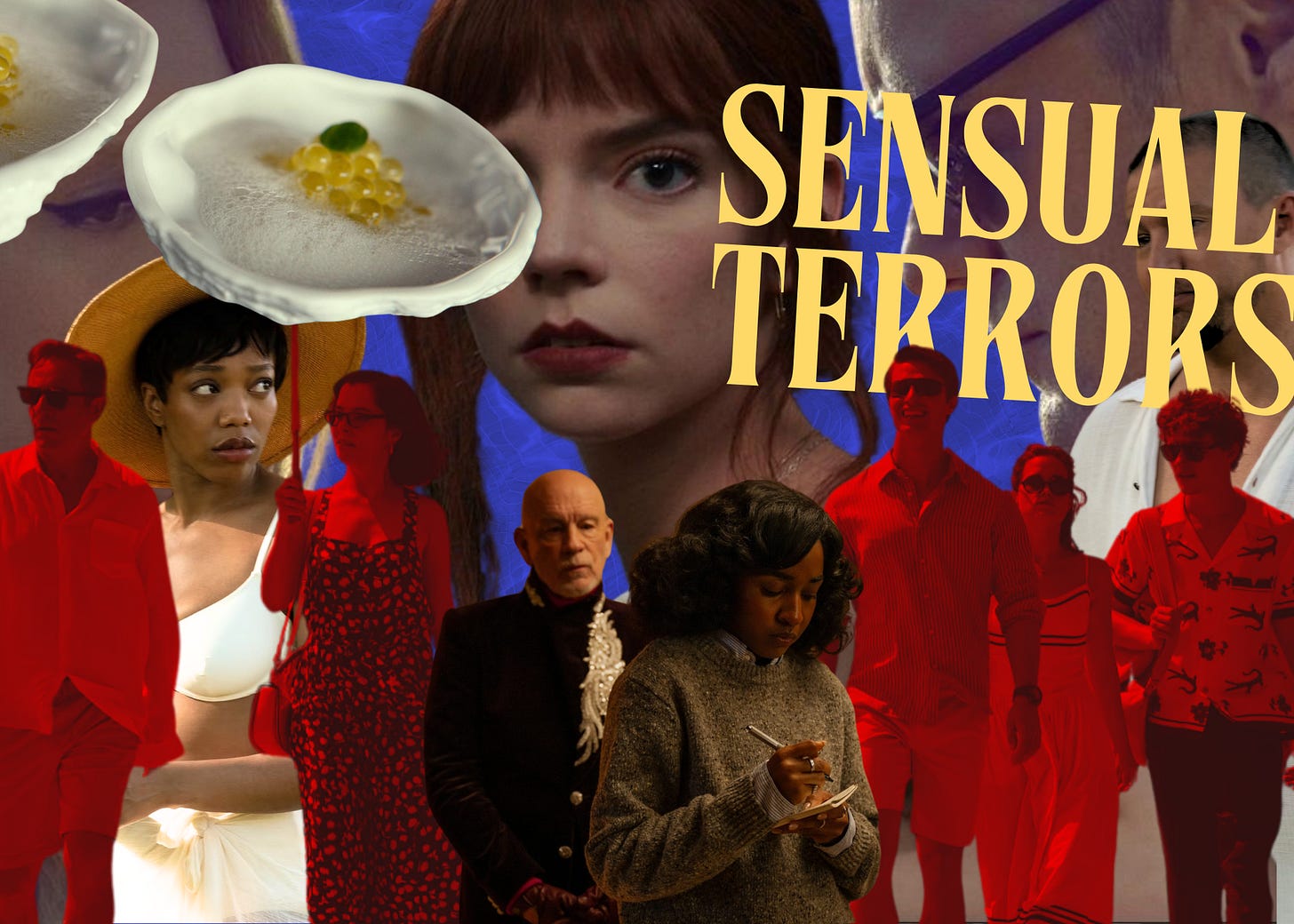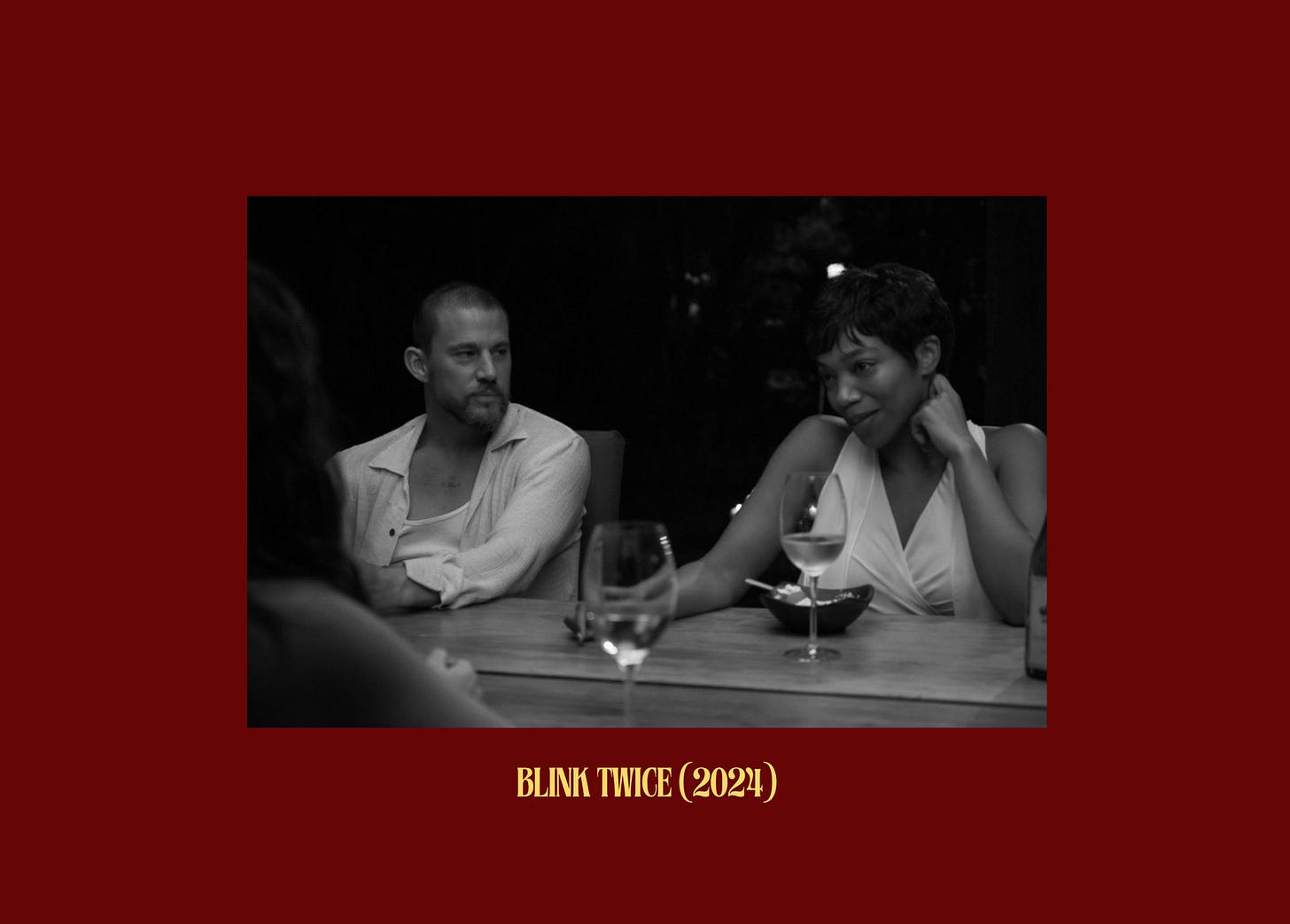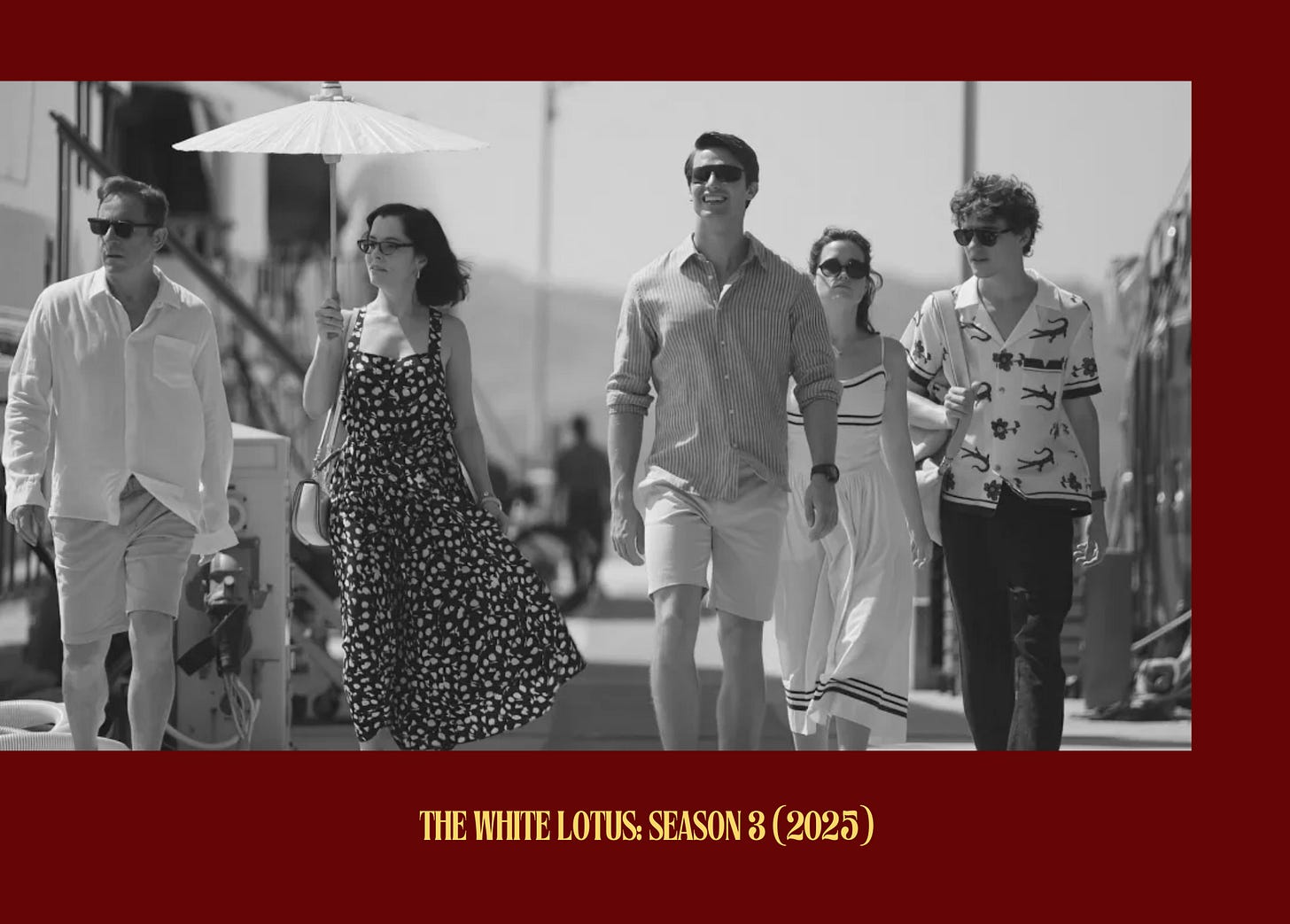GUT REACTIONS: The White Lotus & the enduring terror of "vacation horror"
From The White Lotus to "Opus" and "The Menu," the terror of vacation can be as grounded or gory as you want it to be.
In my GUT REACTIONS series, I contextualize films with their cultural significance. This installment talks about execution and cannibalism, and mentions suicidal ideation — because of that damn Ratliff family, naturally.
Even before Aimee Lou Wood’s teeth were a cheap punchline on SNL, there was a sort of malaise around Season 3 of The White Lotus. Online and at parties, I encountered fans scoffing at how boring this season was.
But as a horror scholar, I’m actually fascinated by how increasingly horrific The White Lotus has become as a series.
Be it a too-good-to-be-true resort, or an idyllic cabin in the woods, or even the humble tent à la Blair Witch Project, movies in the genre I’m calling “vacation horror” intrigue me.
The setting is atypical. I’ve seen a million movies where “the house is a bitch,” to use my turn of phrase: From The Amityville Horror (1979) to Paranormal Activity (2007), from Hellraiser (1987) and Elvira: Mistress of the Dark (1988) to Smart House (1999) and Monster House (2006).
That convention of ghosts, demons and other supernatural pests being tied to the home is so common that it feels contrived1 for the most part. The real fear kicks in for me, as a viewer, when a vacation goes terribly, horrendously, monstrously wrong.
It’s not just about the setting being outside of the home. Sure, Suspiria (1977) and the Nosferatu films (1922, 1979, 2024) feel freaky because the protagonist is out of their depth, far from home.
But those protagonists knew that they were going to face something deep and dark and treacherous on their journeys. The effectiveness of vacation horror is not because you’ve traveled somewhere and had something bad happen.
Vacation horror is a mindfuck because you’ve let your guard down. You’re looking to relax, recuperate and rejuvenate — and instead, you’re thrust into the most psychologically challenging caper of your life.
A food tour, a baecation or a press trip from hell
Some of the best vacation horror films have come out in the past few years:
Opus (2025), a horror vehicle seemingly written for Ayo Edebiri’s dry observational humor
Blink Twice (2024), in which Naomi Ackie and Channing Tatum sparkled
The Menu (2022), pushed forward by Ralph Fiennes, Nicholas Hoult and favorite final girl Anya-Taylor Joy
Honorable mentions: The Invitation (2022) which is really just emo eye-candy for the paranormal romance set and Get Out (2017), which forever cemented Jordan Peele and Daniel Kaluuya as people for whom I’m rooting2
Equally seedy and disconcerting has been The White Lotus. I marathoned the first two seasons at the top of the year, but Season 3, the finale of which aired on April 6, 2025, really laid it on thick with the nightmare fuel.
The White Lotus has been billed as a “black” comedy for good reason. It never shied away from the taboo or minced words about harsh realities of the hospitality industry.
Regarding Season 1: One of my best friends was born and raised in Hawai’i, and has recounted how neocolonial attitudes have affected her community’s lives in real time.
My own connection to Hawa’ii was born from and tainted by violent White supremacy.
A dirt-poor Black boy — one of 10 children — from the deeply racist, profoundly rural, segregated Southeastern U.S. had no other options to make it out of his small town but to succumb to the military-industrial complex. That harrowing journey brought him to Hawai’i, where the military has a notable and infamous presence.
I was born right after my parents kissed their Hawai’ian chosen family goodbye; even when I was but a glint in my mother’s eye, Uncle Sam was shuffling me across the globe.
Season 2 built on the themes of Season 1 by detailing White-on-White crime. Along with listening to Måneskin on repeat, my prep for the Rome trip I took in 2022 included reading about the sociology of Italy. I was fascinated to see the prejudices and the quirks of the Sicilians, and the preconceived notions held by the Americans they encountered.
Then, Mike White terrorized us against the backdrop of Thailand, where the tried-and-true formula still tied our stomachs in knots all spring: He reminded us that while the individual stories differ, all rich people are the same: Their antidote to boredom is sexual perversion and murder.
Compounding my feelings about race, class, colonization and privilege was another recent watch: Infinity Pool (2023), starring Alexander Skarsgaard and Mia Goth.
TL;DR on Infinity Pool, per IMDB:
James and Em Foster are enjoying an all-inclusive beach vacation in the fictional island of La Tolqa, when a fatal accident exposes the resort's perverse subculture of hedonistic tourism, reckless violence and surreal horrors.
Sound familiar?
Moreover, I found Infinity Pool damn near unwatchable, save for the understated storytelling, and the way it was artfully shot and edited.
I’m sure the same can be said about White Lotus. The works are mirror images of each other: Uncomfortable sexual politics against the backdrop of pristine rooms, warm weather, beautiful cars and clothes, and… well, infinity pools.
A standout moment of The White Lotus: Fan-favorite Belinda raised her concerns to Fabian, the nervous, neurotic manager of The White Lotus’ Thailand location.
Belinda, a employee of the hotel chain in Hawai’i, has run into a Greg: A man who was the husband of Tanya, a hotel guest who once befriended Belinda a few years prior. Belinda and Tanya’s short-lived friendship dissolves by the Season 1 finale. And by the Season 2 finale, Tanya has met her untimely end — by her husband Greg’s hand.
Belinda’s encounter with Greg is frightening. He’s pretending not to know Belinda, and going by a different name (Gary) and making it known that he’s asking around about Belinda. All in all, it’s deeply suspicious; Belinda thinks Fabian, the main point of contact for staff in Thailand, should be able to help her out.
But when faced with undeniable evidence of Greg’s hit on his former wife, Fabian, without missing a beat, coolly invites Belinda to put it all out of her mind.
The message: Decorum is more important than justice once you’re dealing with guests beyond a certain tax bracket.
This moment between Belinda and Fabian reinforces the earlier observation between unhinged patriarch Timothy Ratliff and Greg/Gary that anyone who goes to Thailand is either “looking for something or hiding from something.” (And of course, the entire Rick3 storyline only buttressed that idea.)
Brandon Cronenberg’s Infinity Pool has the eeriness of Fabian’s gaslighting and the intrigue of our homicidal sugar daddies, Greg and Rick — with a even bigger heaping of blood and guts.
NOTE: SPOILERS AHEAD.
Infinity Pool takes the premise of a show like The White Lotus a step further with that classic Cronenberg4, freaky-deaky speculative fiction futuristic twist: When tourists commit crimes in La Tolqa, they are cloned and put to death.
In case anyone feels like tourists are getting off too easy: You have to watch your own clone be killed, which is often done by a local to La Tolqa.
And for extra emotional damage: The clones are imbued with your real memories and don’t know that they’re a clone, so you have to watch your own (real?) panic as you are murdered.
A greater philosophical question is raised when you start to wonder: Are those the clones getting killed? Or is it the actual tourist, who committed the crime?
What if you didn’t just get to go on with your life? What if the residents of La Tolqa got their lick back by killing you, and your dumb ass is really just a clone, that thinks it got away with something?
What’s even sicker is that the filthy rich, hedonistic tourists who’ve been on La Tolqa forever find perverse they take in literally getting away with murder — for the small price of getting another clone made and watching it be killed.
Just like his father David, Brandon Cronenberg takes it too far — and then further still.
But having watched the Season 3 finale of The White Lotus, I think Mike White and Cronenberg are going band for band.
Apart from the rug-pull moment of realizing that a fun little getaway is not what it seemed on the brochure or when your partner pitched it you, vacation horror continues to delight because it often bears a message.
It’s the same one running through The Menu and Triangle of Sadness (also 2022, so often spoken about in the same breath as The Menu), and Blink Twice and Opus. It’s the message that rings true of The Invitation and Get Out in many ways, too: “Eat the rich or the rich will eat you.”
Further: “You’ll have some time to escape, because first, they’ll hunt you for sport. Those who suffer from ennui take great pleasure in first playing with their food.”
Infinity Pool may be on the far end of the spectrum for viscera. The White Lotus, despite its spots of blood and fantastical suicidal ideation, may be more tame.
But it’s just as effective as any horror-head’s fave movie. As a creative, you don’t need to show detailed bodily mutilation or cannibalism, or vampires exploding ,or a human body being molded and 3D printed to scare the living daylights out of your audience.
People, as is, are scary enough.
I do think that the home as a setting for horror works best in conjunction with commentary on gender roles and women’s domain of the domestic sphere — something I wrote about for Night Terror Magazine.
[Issa Rae voice] “I’m rooting for everybody Black!”
I’m down bad for Walton Goggins and his ridiculously bulbous forehead and plush toothy grin and crinkled sunken eyes. Yes, I’m a film critic, but I’m also a human being.
I guess being a deep thinker and a pervert runs in the family: One of my first pieces for SENSUAL TERRORS explored the filmography of Brandon Cronenberg’s pappy.












